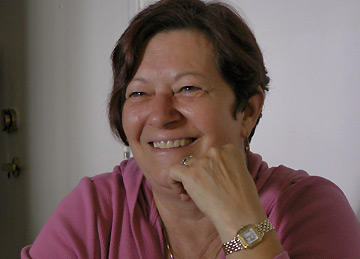Christiane

Cares for her husband
Age at interview: 61
Age at start of caregiving: 51
Christiane (61 years old) is married and has two grown sons from a former marriage. Her husband (80 years old) has chronic obstructive pulmonary disease (COPD) and Parkinson’s Disease. Christiane has just made the difficult decision to place her husband in a long-term care facility as she is no longer able to provide the necessary care for his increasing dependence. Christiane worked most of her life as a child-care worker in a daycare but was recently obliged to retire due to her own health problems.
Christiane’s caregiving started ten years ago when her husband was diagnosed with Parkinson’s disease. Due to his illness, Christiane’s husband became isolated to the point of refusing to leave the house even to visit the doctor. Christiane pleaded for professional healthcare support: a social worker and eventually a doctor began to pay visits to their home. Nevertheless, her husband’s condition continued to deteriorate until he needed 24/7 care.
Christiane experienced two particularly difficult periods when her husband became incontinent and when he started to suffer from dementia. She felt unable to leave her husband for a single moment. In order to socialize with friends and family, she had to arrange for a privately paid care provider for her husband, which was financially difficult. She remembers one period when she could not leave the house for nine days and had to ask someone else to do their shopping. She resorted to walking up and down the stairs of her apartment building just to get some exercise herself.
By this time, both the physical and mental aspects of her caregiving situation had become a major challenge. Yet Christiane still did not feel ready to let go of her husband’s care. A main reason for this was that she had had some negative experiences with the quality of care when he was hospitalised and then in respite care. Finding help in the health system has been a time-consuming process for Christiane. She feels that she has had to practically discover the caregiving services herself. Hospital staff gave her little information regarding resources, access to support services and financial assistance. In spite of her own medical issues, she has had to provide most of the physical care that her husband needed due to a lack of availability of home-care services. Only last year Christiane began to receive support at home from the local CLSC, who gave two hours per week with things like helping her husband shower.
A few months ago Christiane’s husband was offered a place in a long-term care facility. Following a few bad incidents at home, she realised that she was no longer able to meet her husband’s needs. It was time to make the difficult decision to have him placed. Nevertheless, this long-term placement has not fully released Christiane of her caregiving responsibilities. She still visits the care facility daily, as she worries about the care her husband receives, and she still struggles to manage their financial situation.
Today Christiane finds a lot of support in a local caregiver’s organisation (l’Association des personnes aidantes). She tries to attend most of their activities in order to enjoy her much-needed breaks.
More content
- Legal issues -ChristianeGetting a mandate in case of incapacity costs a lot of money, which Christiane is unable to pay at this moment.
- The future and caregiving – ChristianeChristiane knows she needs a break; she worries about what will happen to her husband if she gets sick.
- Support from family and friends – ChristianeChristiane finds it difficult to ask friends for help, especially since she is not able to pay them.
- Social impact and lifestyle changes – ChristianeChristiane feels isolated because it seems that her friends don’t want to visit anymore.
- Resources – ChristianeThanks to arrangements made possible by her support group, Christiane is able to attend conferences and other activities organized by the caregivers group.
- Providing support – ChristianeOne weekend, Christiane had to move her husband in bed. And with her back problem, she wonders what might happen if she had to do it again.
- Navigating the system – ChristianeChristiane had to make many phone calls to arrange for things like a wheelchair and home care support.
- Interaction with professionals – ChristianeChristiane told her social worker about a solution she found herself.
- Hospitals and facilities (2) – ChristianeChristiane has to check-up regularly on how the facility is caring for her husband.
- Hospitals and facilities – ChristianeChristiane struggled with the decision to move her husband to a facility; her parents helped her make the decision.